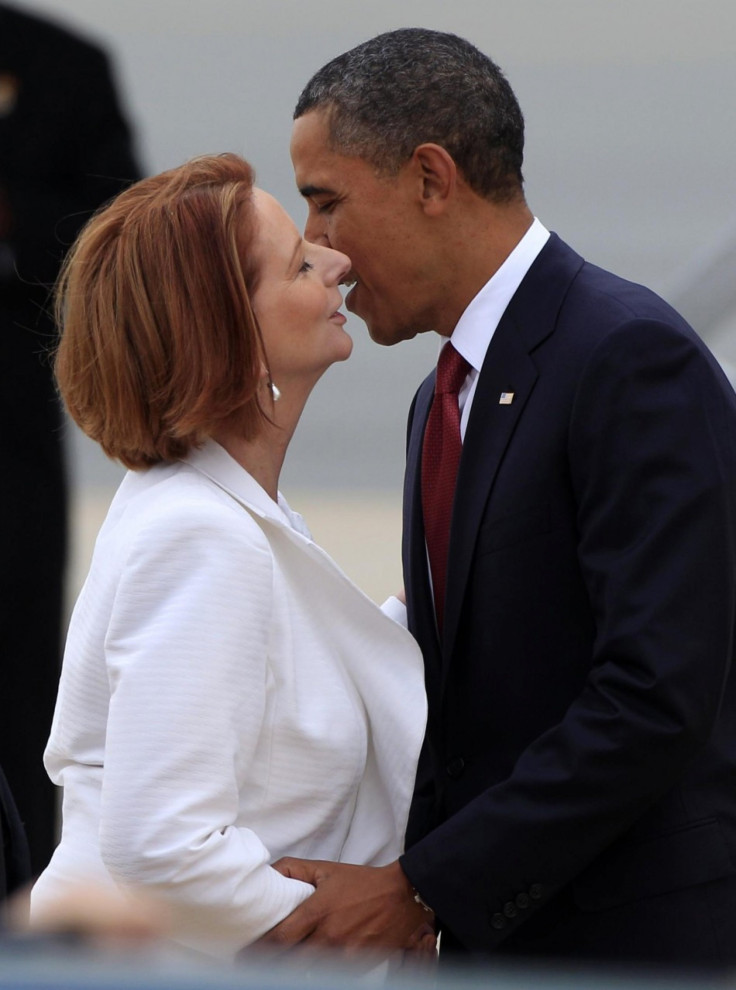Obama, in Australia, Announces Basing of Marines in Darwin

President Barack Obama and Australian Prime Minister Julia Gillard Wednesday unveiled plans to deepen the U.S. military presence in the Asia-Pacific, with 2,500 U.S. marines operating out of a de facto base in northern Australia.
U.S. troops and aircraft will operate out of the tropical city of Darwin, only 820 kms (500 miles) from Indonesia, able to respond quickly to any humanitarian and security issues in Southeast Asia, where disputes over sovereignty of the South China Sea are causing rising tensions.
With my visit to the region, I am making it clear that the United States is stepping up its commitment to the entire Asia-Pacific region, Obama told a joint news conference with Gillard in Canberra.
It is appropriate for us to make sure...that the security architecture for the region is updated for the 21st century and this initiative is going to allow us to do that, he said.
The U.S. deployment to Australia is likely to add to China's concerns that Washington is trying to encircle it with bases in Japan and South Korea and now troops in Australia.
But Obama stressed that China was not being isolated.
The notion that we fear China is mistaken. The notion that we are looking to exclude China is mistaken, he said, adding China was not being excluded from the planned Transpacific Partnership on trade.
We welcome a rising, peaceful China, he said.
But China's rising power means it must take on greater responsibilities to ensure free trade and security in the region, he added.
It's important for them to play by the rules of the road and, in fact, help underwrite the rules that have allowed so much remarkable economic progress, Obama said.
China questioned the plan, saying it was open to discussion on whether strengthening military alliances was beneficial to the international community.
China stands for peaceful development and cooperation. Foreign Ministry spokesman Liu Weimin said when asked about the proposed deepening of military cooperation.
We also believe that the external policies of countries in the region should develop along these lines, Liu told a regular news briefing in Beijing.
Some Asian nations are expected to welcome the U.S. move as a counterbalance to China's growing power, especially its expanding maritime operations, and a reassurance that Washington will not scale back its engagement in the region due to a stretched U.S. military budget.
The United States hopes to militarily strengthen alliance relations with Japan in the north and with Australia in the south, with the clear intention of counter-balancing China, Su Hao, the director of the Asia-Pacific Researcher Center at the Foreign Affairs University in Beijing, told the Global Times, a popular Chinese newspaper.
OBAMA TO RAISE SOUTH CHINA SEA AT SUMMIT
Obama's visit to Australia, greeted with a 21 gun salute, marks 60 years of the U.S.-Australia alliance which has seen their troops fight in every major war.
To the People of Australia, with whom we have stood together for a century of progress and sacrifice. On this 60th Anniversary of our Alliance, we resolve that our bonds will never be broken, and our friendship will last for all time, he wrote in Gillard's guest book.
The winding down of wars in Afghanistan and Iraq has opened the door to greater U.S. attention to simmering tension over the South China Sea, a shipping lane for more than $5 trillion in annual trade that the United States wants to keep open.
Obama plans to raise maritime security in the South China Sea at a regional summit on Bali this week, defying China's desire to keep this sensitive topic off the agenda.
China claims the entire maritime region, a vital commercial shipping route rich in oil, minerals and fishery resources.
But Vietnam, the Philippines, Taiwan, Malaysia and Brunei hold rival claims to at least parts of the sea and tension occasionally flares up into maritime standoffs.
China has generally sought to avoid flare-ups over tensions with the United States and its allies in 2011.
Obama will make an anchor speech outlining the U.S. vision for the Asia-Pacific to the Australian Parliament on Thursday before a whistle stop in Darwin. He then flies to the Indonesian island of Bali for the East Asia summit.
DE FACTO BASE
Darwin, nicknamed the Pearl Harbor of Australia after a World War II Japanese raid dropped more bombs on the city than those on Pearl Harbor, will give the U.S. military open access to East Asia sea lanes and the Indian Ocean.
Australia says hosting U.S. troops and the pre-positioning of U.S. supplies in Darwin is not the precursor to a U.S. base, but analysts say rotating more than 2,000 U.S. Marines in and out of the northern port city, and more frequent U.S. naval visits, will give Washington a de facto base.
The Chinese have gotten used to the fact that Australia and the United States have a very close military relationship. They expect nothing different, said Australian Defense Minister Kim Beazley.
Australia and the United States jointly operate an intelligence base at Pine Gap in the Australian outback and routinely take part in military exercises. But the Darwin deployment will be the largest in Australia since World War II, when General Douglas MacArthur moved his war headquarters there.
Analysts say Australia needs to balance its military relationship with the United States with its economic dependence on China, which is a voracious buyer or coal, iron ore and other resources.
Economic cooperation with China is increasingly important for Australia's future development, said Su from the Foreign Affairs University in Beijing.
On the other hand, Australia is committed to maintaining its traditional alliance with the United States...That's a security challenge for Australia. I'm sure that Australia won't take this too far.
(Additional reporting by Michael Perry and Jim Regan in Sydney; Editing by Lincoln Feast)
© Copyright Thomson Reuters 2024. All rights reserved.




















